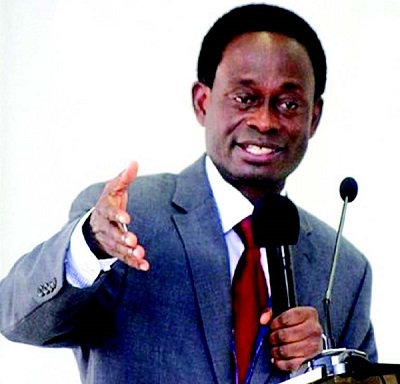
If you are a Ghanaian with zero tolerance for deception and abuses in the Christian community, you may have asked yourself many times why predictions by Ghanaian so-called prophets about the death of celebrities, including Presidents, turn out to be false 90 percent of the time.
You may also have wondered why prophecies fore-telling the outcome of major football matches involving the Black Stars nearly always go wrong.
Apostle Opoku Onyinah, fifth Chairman of the Church of Pentecost, former Chairman of the Ghana Pentecostal Council and one timeVice Chancellor of the Pentecost University, has the explanation.
In his latest book, APOSTLES & PROPHETS, the revered theologian, apostle and pathfindier (founder of what has become known as International Worship Centre of Church of Pentecost world wide), admits that such a prophet may hear from God, but in delivering the message, the prophet may have dabbled in what the author describes as “prophetic flaws”, which flaws could lead him to mix it with his (prophet’s) own additions and subtractions, lies and exaggerations.
Also, it is very likely that “the particular prophet is not living right,” and his mind is occupied with the riches and cares of the world
In sum, says the author, “The measure of a person’s surrender will determine how the Lord will use him… Someone may be an apostle or prophet but may not surrender fully to the Lord’s will. This will impair the way the Lord will continue to use him”.
Far from claiming to be a paragon of morality and while he is not standing in judgement against anyone, Onyinahis at pains to point out that “there are many people serving as pastors who do not know the Lord.”
Who are these? His list includes “pastors who are immoral, defiling young girls and chasing other people’s wives; pastors who manipulate church systems to their own benefit … extremely focused on fashion, including those changing and acquiring clothes, vehicles and houses at the expense of the kingdom work.”
In sum, he writes: “The prophetic call is not a call to boast of the property that one has or live a flamboyant lifestyle… The true minister sees these as fleshy and vain. Ministers who run after these are like children who need to be taught the basic things of Christ again.”
He uses the examples of the sons of Eli, namely Hophni and Phinehas, and quotes from the Book of Hebrews to remind today’s pastors, prophets and apostles that “We have an altar from which those who minister at the tabernacle have no right to eat”.
So who is a prophet and who is an apostle?
Says Onyinah: “Apostles are messengers of God. They are the sent, like Moses and the prophets Isaiah, Jeremiah”. Some graces associated with apostleship include a call, teaching ability, leadership and administration or governance, signs, wonders and miracles.
The book defines a prophet as “an inspired spokesman, the mouthpiece and the messenger of God on earth… He/she (can) hear from God, receive revelations from God and (is) required to speak what God has revealed to them.”
But (and it should be a big BUT), Onyinah states that“The fact that God speaks to a person does not make them a prophet”. As examples, he cites Cain, after he killed Abel, and King Abimelech, who was warned directly by God not to touch Abraham’s wife. What these mean is that “God does not only speak to righteous people; he speaks also to sinners”
In painstaking detail, the author offers a step-by-step approach about how a prophet hears from God, the process of receiving a revelation, a word of knowledge or word of wisdom.
That said, the author is minded to warn that “Having a revelation from the Lord does not make you a prophet at once. Prophets must go through the mill before they can be refined for the use of the Master.”
In typical Church of Pentecost/Apostolic Church language, which some contemporary men/women of God may find uncomfortable pointing out to their youthful members, Onyinah minces no words that “a young woman who is living for the Lord will not dress up to expose her cleavage.”
In authoring ‘Apostles and Prophets’, Opoku Onyinah is not writing hearsay or pouring university lecture notes. He stands in those Christian ministerial offices which he writes about.
In the Introduction, he sets out his methodology thus: “I dig out from available first and second century books to find out the roles of church officers during those periods. Then I select a few church fathers and analyse the type of gifts they had and how the community recognised them”.
Like archaeologists who dig into graves to discover evidence of time and cultures, Onyinah digs into the Bible with a fine toothcomb, practicalizes his findings in his own ministry, beefs up everything with a generous sprinkling of personal practical examples and leaves the world to appreciate that which is pure, noble, praiseworthy in ministry.
This book is written by a teacher and like all good teachers, he has left his students (the readers) with copious notes in this manual. For what it has been published to achieve, ‘Apostles and Prophets’ is a reference material to be placed within reach.
The content of the book should be the subject of a series of seminars/workshops facilitated by the author, seminars to which both young and old men/women of God must find money or be sponsored to attend.
Particularly because of the endless stream of complaints by the Christian Council, the Pentecostal and Charismatic Council etcagainst abuses in the Church, I charge all these ecumenical bodies to stop complaining and take the practical step of sponsoring prophets and apostles, especially those operating outside authority, to attend and be taught.
Next after the Bible, ‘Apostles and Prophets’ must be one of the compulsory possessions of every Christian in ministry. Try reading it and see the effect: your eyes of understanding will be enlightened. Ignorance will be banished because wrong doctrine will be exposed.
Author: Apostle Opoku Onyinah
No of Pages: 387
Reviewer: Enimil Ashon




